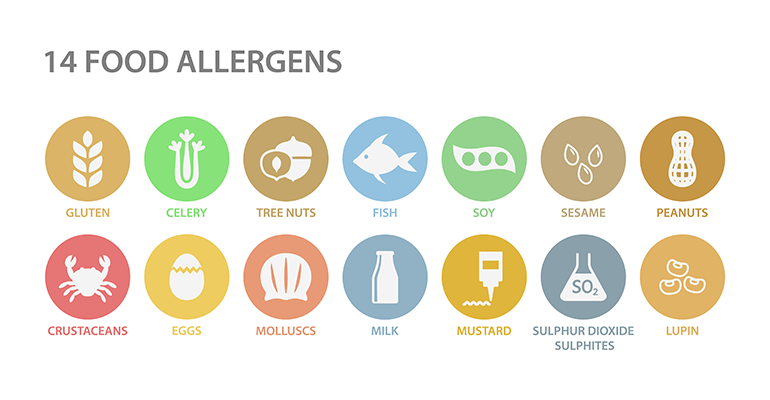News
Could allergen near misses enter food safety procedures?
30 Oct 2023A new report calls for better food allergy near-miss procedures after finding a lack of reporting consistency and food industry support.
Hospitality Allergen Support UK (HASUK) has published its first report on food allergy near-misses. The campaign highlights the importance of near-miss reporting and recommends it becomes part of overall food safety procedures across the industry to prevent accidental deaths from cross-contamination with allergens.

Greenwich University collaborated with HASUK to produce the report, which the organisation says is the first overview of the current situation with near-miss reporting. A near miss occurs when a team member, chef, or front of house staff (FHS) realises that the meal prepared for the customer is unsuitable. The customer may spot that the meal is not ideal for their diet and a serious reaction may have occurred if they had eaten the item.
Allergies represent Europe’s most prominent and ongoing disease, with predictions estimating that by 2025, half of the European Union’s population will be impacted, Allergy UK states. In the UK alone, 44% of British adults have at least one allergy. “At Allergy UK, we are more than aware that incidents of near misses continue to impact the food-allergic community at a worrying rate,” Simone Miles, CEO of Allergy UK, told Ingredients Network.
Allergy report findings
HASUK sought to obtain views and data from consumers and the hospitality sector to see if the industry was monitoring and investigating near-misses. However, their feedback was either limited or predominantly from businesses already monitoring near-miss incidents and with clear procedures.
In the consumer report, the organisation spoke with 82 respondents between 18-70 years within the UK. Sentiments shared included “flippant and uncaring” venues, receiving no acknowledgement of feedback, and uncertainty over where to report near-miss incidents.
Of those asked in the hospitality sector, 82% did have near-miss reporting as part of the health and safety procedures. However, one person stated they were actively discouraged from formally reporting issues within their business. Almost three-fifths (59%) said they were not confident in providing allergy information to customers.
Further, in polls at the Chartered Institute of Environmental Health (CIEH) Safe Food Conference in 2022, Caroline Benjamin, co-founder of HASUK, reported that 79% of respondents said they had never seen near misses documented and only 2% of companies fully comply when providing allergen information.
Near-miss occurrences
“Near-miss incidents will happen as human error cannot be eradicated completely,” says Jacqui McPeake, founder and director of JACS. HASUK recognises there have been great improvements in this area and different systems in place to record and track near-miss incidents within large hospitality organisations. However, it is concerned that small and medium-sized businesses are missing out due to lack of resources.
 © AdobeStock/Tsvetina
© AdobeStock/Tsvetina
Support is needed to better protect against near misses in food and hospitality. It is vital to recognise what constitutes a ‘near miss’ and how to investigate, record and learn from them.
“Specific tools which can be tailored to an individual sector or business to identify risks and implement effective controls,” says Dr Hazel Gowland from Allergy Action.
Action beyond documenting near-misses
HASUK would like clear, robust procedures for monitoring and investigating the incident to highlight areas needing review within the processes. Reviewing incidents will make it easier to see emerging patterns and trends.
Best practices currently revolve around allergen procedures that record near misses, including robust investigation of each incident with appropriate actions and updates. HASUK is calling for these to become standard practice across the hospitality sector. “We believe that food businesses should include reviewing and investigating as part of the food safety process,” says McPeake.
Lessons learned will lead to amended controls being revalidated and reverified to address future risks. Long-term monitoring and analysis of suppliers, ingredients and product data, kitchen and service practices, staff and guest staff feedback, customer allergen-related requests and complaints, focus group reports, and insight for new product development (NPD) will all enable business-specific decision-making to reduce risks and enhance guest safety and choice.
“Admitting mistakes is a sensitive issue, particularly when lives and health are at stake and where a business may face prosecution, reputational damage or a civil claim,” says Gowland. Incidents involving alleged or confirmed ill health should be investigated, recorded and followed up formally and involve public authorities, such as food safety, food standards, health and safety, and, more rarely, the police.
“‘Near misses’ for food business operators should also include any scenario which, if not recognised and addressed, could have led to inadvertent consumption of, or exposure to a food allergen or other ingredient being avoided,” adds Gowland.
 © AdobeStock/dusanpetkovic1
© AdobeStock/dusanpetkovic1
“We believe the catering industry requires more comprehensive support in allergy training, which also explores how to implement allergy awareness in kitchen and dining settings,” says Miles. The training needs to be applied individually for accreditation rather than per establishment due to this sector's typical staff attrition rate.
“Full and transparent labelling of all ingredients that can be disclosed to customers would also mitigate many of the risks associated with the food allergic community dining out,” Miles continues. “However, for this to be effective, the full supply chain needs more robust compliance on labelling to recognise when product substitutions are made,” adds Miles.
Industry best practice guidance provides information on good hygiene practices. Various training tools are available in the food allergens risk assessment toolkit for catering and hospitality, Food allergy and intolerance training and allergen cross-contamination in catering – prevention and customer information.